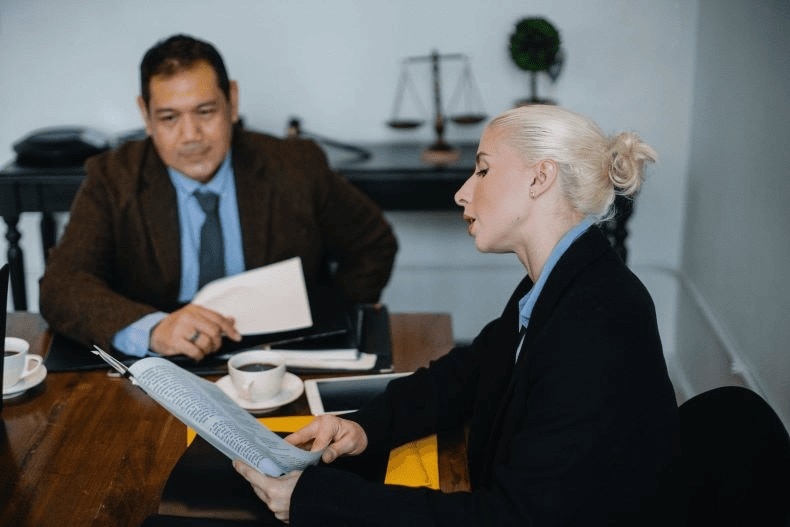
While pulling out of your driveway, you might not expect to encounter legal complexities. Yet, accidents in this scenario happen more often than you might think. If you’ve found yourself in such a situation, navigating the legal landscape can feel overwhelming. However, you need to understand your rights and available options. Here, we’ll walk you through the legal considerations and recourse available to you.
Key Takeaways
Determining fault in driveway car accidents can be complex. Drivers often share responsibility in such cases.
Promptly reporting the car accident to your insurer and gathering necessary evidence is crucial.
Seek legal assistance from experienced personal injury lawyers specializing in motor vehicle accidents to navigate complexities and seek fair compensation.
Determining Fault in Driveway Car Accidents
When it comes to accidents involving a driver backing out of the driveway, liability isn’t always straightforward. The law requires all drivers to exercise reasonable care and caution while operating their vehicles. In most cases, drivers pulling out of a driveway must yield to oncoming traffic.
However, determining fault depends on many factors:
Traffic Laws and Right of Way:
Adherence to traffic laws plays a significant role. Drivers are typically required to yield to an oncoming vehicle or pedestrian when exiting a driveway onto a road. Failure to yield when necessary can contribute to a fault. Following the speed limit is also a rule everyone must keep in mind when car driving to avoid a vehicle backing accident.
Visibility and Obstructions:
Limited visibility due to obstacles like parked cars, shrubbery, or structures near the driveway can impact fault assessments. Factors hindering a driver’s view might influence the assignment of fault.
Speed and Control:
The speed at which both vehicles were traveling is crucial. If a driver pulls out of a driveway without ensuring it’s safe to do so, they might be considered at fault. Excessive speeding by the other car’s driver can also influence fault.
Contributory Actions:
Actions taken by both drivers leading up to the collision are examined. If one driver fails to take reasonable precautions or fails to signal while pulling out, it could contribute to a fault. Similarly, the other driver’s failure to avoid the collision despite having the opportunity might also be considered.
Commercial Driveways:
In commercial driveways such as parking spaces, property owners can potentially be held liable for accidents under certain circumstances. If the property owner’s negligence, such as poor maintenance, inadequate signage, or unsafe conditions, contributed to your car accident, they might be considered liable.
How to File a Claim in a Driveway Car Accident
Navigating the claims process after a driveway accident requires a systematic approach to ensure your rights are protected and your case is presented effectively.
Here’s a deeper dive into the essential steps:
Reporting to Your Insurance Company
Timely reporting: As soon as an accident occurs, contacting your insurance company is crucial. Most policies require immediate notification, so don’t delay. Provide them with accurate details of the incident, including the time, location, and a brief overview of what transpired. Be honest and forthright, ensuring all pertinent information is communicated.
Understanding coverage limits: Familiarize yourself with your insurance policy to comprehend the coverage limits. Knowing the extent of your coverage aids in managing expectations regarding compensation for damages.
Thorough Documentation
Gather evidence: Documentation is key. Take clear and comprehensive photographs of the accident scene, showing the positioning of the vehicles, the damage location, and any visible injuries. These visual records serve as invaluable evidence when determining fault.
Record statements: Collect statements from witnesses, if available. Their unbiased accounts can corroborate your version of events and support your claim.
Medical records: If injuries are sustained, seek medical attention immediately. Documenting your injuries through medical records is essential for establishing the extent of harm caused.
Establishing Fault and Supporting Your Claim
Assessment of fault: Insurance companies and legal entities assess fault based on evidence presented. Your meticulous documentation aids in establishing a clear picture of what transpired. It helps in determining who bears responsibility for the accident.
Claim substantiation: The evidence collected serves as the backbone of your claim. It supports your version of events and substantiates your need for compensation. This evidence can include everything from photos of the damage to the vehicles involved, medical bills, repair estimates, and any other relevant documentation.
Seek Legal Help
Legal guidance: In complex cases or situations where the fault is disputed, seeking legal counsel is advisable. Experienced personal injury lawyers specializing in motor vehicle accidents can provide invaluable guidance. They navigate the legal intricacies, negotiate with insurance companies, and, if needed, represent you in court.
Statute of limitations: Be mindful of the time limits within which you can file a legal claim. In Nevada, the statute of limitations for personal injury claims is two years from the day of your accident. So, you need to act within the specified timeframe to protect your rights, and hiring an attorney is the best way to do so, as they know these legal timeframes.
Assessment of damages: Experienced personal injury lawyers specializing in motor vehicle accidents meticulously evaluate the extent of your damages. They consider not only immediate expenses but also future costs related to ongoing medical care or reduced earning capacity.
Negotiating fair compensation: Legal professionals advocate on your behalf, engaging with insurance companies or representing you in legal proceedings. Their goal is to ensure you receive fair compensation that comprehensively covers your losses and damages.
Seeking Compensation for Damages
Recovering from injuries sustained in driveway accidents can be physically, emotionally, and financially challenging. Seeking compensation for these damages is a crucial step towards rebuilding your life. Here’s an in-depth look at seeking compensation for various losses:
Covering medical expenses: Compensation aims to cover medical bills incurred due to the accident, including hospital stays, surgeries, medications, therapy, and ongoing treatments necessary for recovery.
Recovery of lost wages: Compensation can include reimbursement for the income lost during the period of incapacity caused by the accident. This extends to future earnings if the injuries affect your ability to work in the long term.
Pain and suffering: In addition to tangible economic losses, compensation seeks to address intangible damages, such as physical pain, emotional distress, and the impact on your overall quality of life.

Contact BLG for a Free Consultation
Pulling out of your driveway should be routine, but accidents can happen. Understanding the legal implications and your rights is crucial in navigating the aftermath. Remember, seeking legal guidance early can make a substantial difference in the outcome of your case.
No matter the complexity, you’re not alone. BLG is here to support you, offering expertise and advocacy to ensure your rights are protected and you receive fair compensation.
Take the first step towards resolution—reach out to us for a free consultation today. Your peace of mind is our priority.
FAQs
Q. Who is usually at fault in a driveway accident?
A. Determining fault in driveway accidents depends on various factors. Often, both drivers share liability based on their actions leading up to the collision. Factors like visibility, speed, and adherence to traffic rules play key roles.
Q. What evidence should I gather after a driveway accident?
A. Collect as much evidence as possible: photos of the scene and vehicle damage, statements from witnesses, and any relevant documentation, like medical records or repair estimates. These pieces of evidence help establish fault and support your claim.
Q. Should I contact my insurance company after a driveway accident?
A. Yes, it’s crucial to report the accident to your insurance company promptly. Most policies require immediate notification. Be honest and provide accurate details of the incident to initiate the claims process.
Q. Can I pursue legal action after a driveway accident?
A. If you believe you’re not at fault or if there are complexities in determining fault, seeking legal counsel is advisable. Experienced personal injury lawyers can assess your case, negotiate with insurance companies, or represent you in court if necessary.
Q. What happens if both drivers were partially at fault in the accident?
A. In cases of contributory negligence, each driver might bear a portion of the fault. This can impact the compensation you’re entitled to receive.
Q. How long do I have to file a legal claim after a driveway accident?
A. The time limit, known as the statute of limitations, varies by state and the type of claim. In most states, it’s typically 2 to 4 years. It’s crucial to act within this specified timeframe to protect your rights.
Q. What if the other driver was excessively speeding when the accident happened?
A. Excessive speeding or violations of traffic rules by the other driver can impact fault assignments. Such actions might contribute to shared liability or even hold the other driver primarily responsible for the accident.





